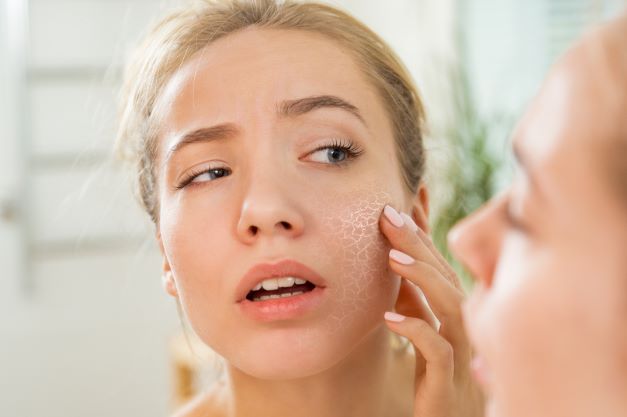Winter can be harsh on your skin, leaving it dry, flaky, and less radiant. Whether you’re a seasoned beauty enthusiast or a skincare newbie, understanding how to protect and nourish your skin during the colder months is essential. In this post, we’ll explore the benefits of two popular winter skincare staples—face oils and hyaluronic acid serums—and help you determine which is best for your needs.
Understanding Winter Skin
Winter brings delightful snowfalls and cozy nights, but it can also wreak havoc on your skin. Cold air, low humidity, and indoor heating can strip your skin of its natural moisture, leading to dryness and irritation. This change in weather often requires an adjustment in your skincare routine to ensure your skin remains hydrated and healthy.
Skin tends to become more sensitive in winter, making it prone to redness and discomfort. Your usual products might not cut it; your skin needs extra care to combat the drying effects of winter. The key is to focus on hydration and moisture retention to maintain a healthy skin barrier.
Your skin’s needs can vary based on your skin type. While those with oily skin might experience a slight reduction in oiliness, people with dry skin can suffer significantly during winter. Adapting your skincare routine to these seasonal changes is crucial for maintaining your skin’s health and glow.
The Benefits of Hyaluronic Acid
Hyaluronic acid is a powerhouse ingredient renowned for its hydrating properties. This naturally occurring substance in our skin has the incredible ability to hold up to 1,000 times its weight in water, making it an ideal component for hydration.
How Hyaluronic Acid Works
Hyaluronic acid works by drawing moisture from the environment into the skin, keeping it plump and hydrated. It acts like a sponge, not only attracting water but also locking it in. This hydration helps to smooth fine lines and improve skin’s texture, making it a go-to ingredient for all skin types.
Suitable for All Skin Types
One of the best features of hyaluronic acid is its compatibility with various skin types. Whether you have oily, dry, or combination skin, hyaluronic acid can provide the hydration your skin needs without feeling heavy or greasy. It’s also non-comedogenic, meaning it won’t clog pores, which is great news for acne-prone individuals.
Boosting Your Skincare Routine
Adding a hyaluronic acid serum to your routine can enhance your overall skincare regimen. By providing an extra layer of hydration, it prepares your skin to better absorb other products, maximizing their effectiveness. This makes hyaluronic acid a versatile and essential component of a winter skincare routine.
The Power of Facial Oils in Winter
While hyaluronic acid focuses on hydration, facial oils are all about sealing in moisture and providing nourishment. They offer a rich source of essential fatty acids and antioxidants that can protect and repair the skin, making them a valuable addition to any winter skincare regimen.
Nourishing and Protecting
Facial oils create a barrier on the skin’s surface, preventing moisture loss and shielding your skin from harsh environmental factors like wind and cold. They are especially beneficial for dry and mature skin types, offering deep nourishment that penetrates the skin’s layers.
Variety of Oils
There is a wide range of facial oils to choose from, each with its unique benefits. For example, argan oil is known for its moisturizing properties and is rich in vitamin E, while rosehip oil is packed with antioxidants and can help with skin regeneration. Jojoba oil mimics the skin’s natural sebum, making it suitable for balancing oil production.
Not Just for Dry Skin
Contrary to popular belief, facial oils can be beneficial for oily and acne-prone skin as well. Oils like tea tree and jojoba can help regulate sebum production and soothe inflammation. The key is to choose the right oil for your skin type and concerns.
Choosing the Right Product for Your Skin
Selecting the right product depends on your specific skin needs and concerns. Here are some tips to help you decide whether to reach for a hyaluronic acid serum or a facial oil this winter:
For Hydration
If your primary concern is hydration, hyaluronic acid serums are a fantastic choice. They provide lightweight, non-greasy moisture and are perfect for layering under other skincare products. People with oily or combination skin will especially appreciate its hydrating yet non-comedogenic properties.
For Moisture Retention
For those dealing with extreme dryness or looking for additional nourishment, facial oils are the way to go. They help lock in moisture and provide essential nutrients that support skin health. Dry and mature skin types will benefit greatly from the rich, emollient properties of facial oils.
Dual Approach
Why not use both? Many skincare enthusiasts find that combining a hyaluronic acid serum with a facial oil offers the best of both worlds. Apply the serum first to hydrate the skin, followed by the oil to lock in that hydration and provide extra nourishment.
Application Guide
Incorporating these products into your winter skincare routine can be straightforward and highly effective. Here’s a simple guide to get you started:
Step 1: Cleanse
Begin with a gentle cleanser that won’t strip your skin of its natural oils. Cleansing is crucial for removing dirt and impurities, allowing your skincare products to penetrate effectively.
Step 2: Hydrate
Apply a hyaluronic acid serum to damp skin to boost hydration. Use gentle, upward strokes to ensure even distribution. Allow the serum to fully absorb into the skin before moving on to the next step.
Step 3: Moisturize
Follow up with your regular moisturizer to provide an additional layer of hydration. This step is essential for maintaining a healthy skin barrier, especially in the winter.
Step 4: Seal
Finish with a facial oil to lock in all the moisture and add a protective barrier against harsh winter elements. A few drops are all you need; gently press the oil into your skin for optimal absorption.
Real-Life Experiences
To give you a better idea of how these products perform, let’s hear from some individuals who have successfully used them in their winter skincare routines:
Sarah’s Story
“I’ve always struggled with dry, flaky skin during winter. Adding a hyaluronic acid serum to my routine made a huge difference. My skin feels hydrated and looks plump, even in the coldest weather.”
Emily’s Experience
“As someone with combination skin, I was hesitant to try facial oils. But after using jojoba oil, I’ve noticed my skin is more balanced and doesn’t get as oily throughout the day. It’s been a game-changer for my winter skincare routine.”
Mike’s Testimonial
“Mixing a few drops of rosehip oil into my moisturizer has been a lifesaver. My skin feels so much softer and smoother, and I’ve noticed a significant reduction in redness and irritation.”
Conclusion
Winter skincare doesn’t have to be a battle. By understanding the unique needs of your skin and incorporating the right products, you can maintain a radiant, healthy complexion all season long. Whether you choose the hydrating benefits of hyaluronic acid or the nourishing properties of facial oils, adapting your routine to the winter months is key.
We’d love to hear about your winter skincare tips and experiences! Share your thoughts in the comments below and join our community of beauty enthusiasts.
Ready to elevate your skincare game? Book a consultation with one of our experts to find the perfect products for your winter skincare routine. Let’s keep your skin glowing, no matter the weather!





